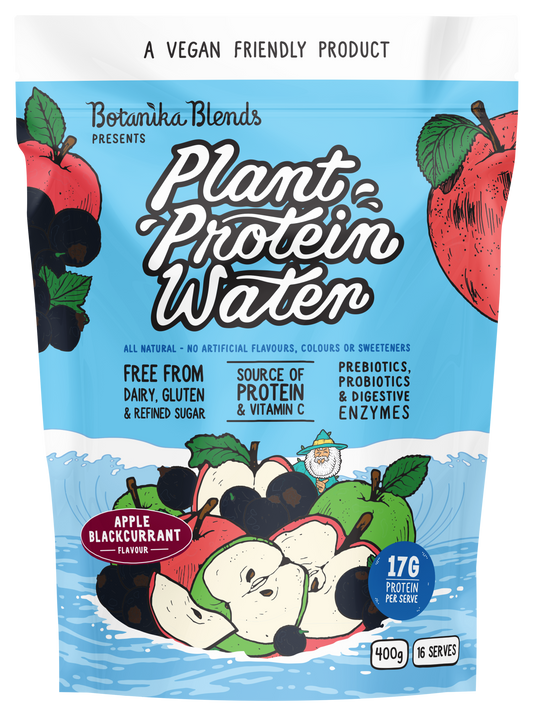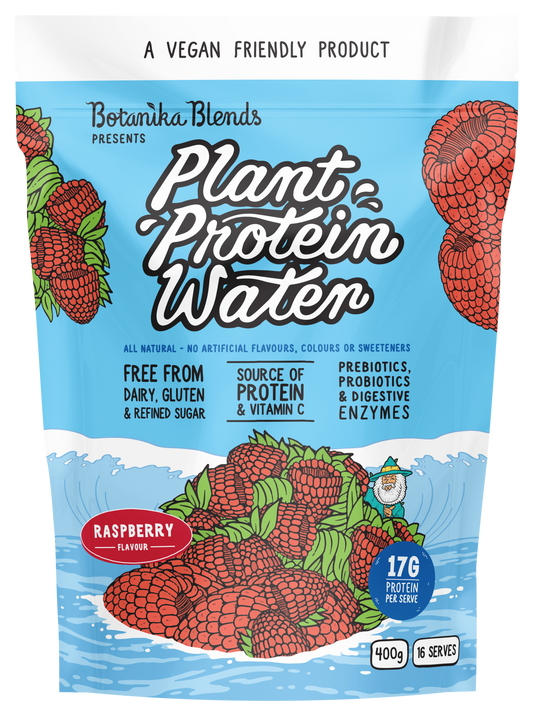-
Plant Protein Water Apple Blackcurrant
Vendor:Botanika BlendsRegular price $34.06Regular priceUnit price per -
Plant Protein Water Raspberry
Vendor:Botanika BlendsRegular price $34.06Regular priceUnit price per
FAQ Protein Water (Clear Protein)
What is protein water?
Protein water is a beverage that combines water with high-quality protein, typically whey protein isolate, to provide a clear, refreshing, and low-calorie source of protein.
How is protein water different from traditional protein shakes?
Unlike traditional protein shakes, protein water is clear, lighter, and usually free from milk or cream, making it a more refreshing option.
What type of protein is used in protein water?
Most protein waters use whey protein isolate due to its high protein content and minimal fat and carbohydrate content.
How much protein does protein water typically contain?
Protein water generally contains around 15-25 grams of protein per serving, depending on the brand and formulation.
Are there different flavours of protein water?
Yes, protein water comes in various flavors such as tropical, berry, citrus, and more, providing a refreshing alternative to traditional protein drinks.
What are the benefits of drinking protein water?
Protein water provides a convenient way to increase protein intake, supports muscle recovery and growth, and offers hydration with fewer calories than traditional protein shakes.
Is protein water suitable for weight loss?
Yes, protein water can be beneficial for weight loss as it is low in calories and helps keep you full, potentially reducing overall calorie intake.
Can protein water help with muscle recovery?
Yes, the protein in protein water supports muscle repair and recovery, making it a suitable post-workout beverage.
When is the best time to drink protein water?
Protein water can be consumed at any time of the day, but it is particularly beneficial post-workout, between meals, or as a quick protein boost on the go.
How much protein water should I drink daily?
This depends on your individual protein needs, which vary based on age, weight, activity level, and fitness goals. One to two servings per day can help meet your protein requirements.
Is protein water safe for everyone?
Generally, protein water is safe for most people. However, individuals with dairy allergies should check the protein source, as many use whey protein isolate.
Are there any side effects of drinking protein water?
Some people may experience digestive discomfort, such as bloating or gas, especially if they consume large amounts of protein. It's best to start with small amounts to assess tolerance.
How does protein water compare to protein powder?
Protein water is ready-to-drink and more convenient, whereas protein powder requires mixing with a liquid. Protein water is also lower in calories and carbohydrates compared to most protein shakes.
Is protein water suitable for vegetarians?
Many protein waters use whey protein isolate, which is derived from milk. Vegetarians who consume dairy can include it in their diet, but vegans should look for plant-based protein waters.
Can people with lactose intolerance drink protein water?
Most protein waters use whey protein isolate, which contains very low levels of lactose and is generally well-tolerated by people with lactose intolerance.
What should I look for when choosing protein water?
Look for protein water with a high protein content (15-25 grams per serving), minimal sugars, and no artificial additives. Check the ingredient list for any allergens or unwanted additives.
How should I store protein water?
Store protein water in a cool, dry place, and refrigerate it after opening. Most protein waters have a long shelf life but check the expiration date for freshness.
Can protein water replace meals?
Protein water is not intended to replace meals as it lacks the comprehensive nutrition that a balanced meal provides. It should be used as a supplement to a healthy diet.


